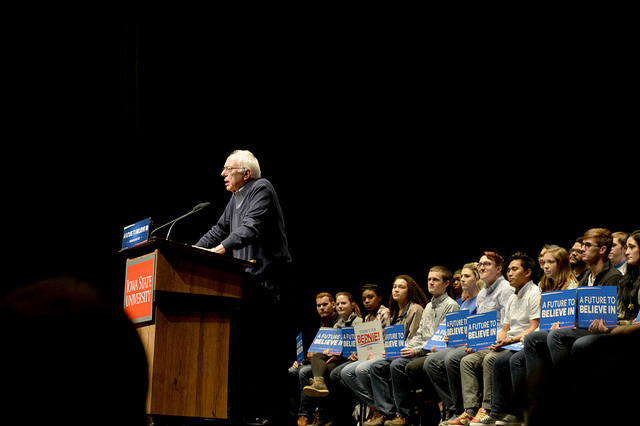
The race for the Democratic presidential nomination has pitted a dreamer against a realist, right? Bernie Sanders is the unrealistic one, and Hillary Clinton, the pragmatist, is the candidate who can get things done.
That’s what many pundits say. But, even with Tuesday’s setbacks to the Sanders campaign, it’s worth examining which is actually unrealistic — Bernie’s pledge to make the country more equitable and sustainable? Or Hillary’s progressive talking points, given her deep ties to corporate power players?
One way to see if Sanders really is a dreamer is to look at his record as mayor of the city of Burlington, Vermont.
As a candidate for mayor in 1980, Sanders focused on economic fairness just as he does today, and then, too, he was dismissed as a fringe candidate. He squeaked into office, winning by just 10 votes. But he was re-elected three times, each time by a larger margin. His accomplishments won over even many of his early opponents, according to professors and authors Peter Dreier and Pierre Clavel, writing in The Nation. And six years into his term, US News and World Report named him one of the top mayors in the country.
When Sanders took office, he quickly became known as a pragmatist. At the time, rising rents threatened to displace lower-income residents. Sanders supported and helped fund the housing groups that later become the Champlain Housing Trust, which, at about 2,800 units, is now the largest, and reportedly the most successful, land trust in the country. The land trust buys and builds single-family homes and apartments, then sells or rents the homes, but holds on to the land so that the homes remain permanently affordable.
Even more than housing, the economy was a major focus of the Sanders administration, and his approach differed from that in most US cities. Instead of competing with other cities to attract big corporations, his administration supported and encouraged local businesses.
The city helped Seventh Generation, a cleaning products company, start up in the 1980s; the company now has $300 million in annual sales.
Will Raap’s Gardener’s Supply Co., is another case in point. With Sanders’ encouragement, Raap moved his company to the site of an old dump in the Intervale area of Burlington. There, the company used leftover heat from a nearby wood-waste-fired generating plant to heat its greenhouses. Over time, and with city support, Raap, the Intervale Center, and others cleared the junk from the land, launched a major composting operation, and formed an incubator where would-be farmers could try their hand at growing food. Now, that original dumpsite has been restored to fertile land, and 12 urban farms are located there, supplying 10 percent of the food sold in Burlington, according to The Nation. And Gardener’s Supply, still located in Burlington, has grown to a 250-person, worker-owned business.
Sanders left office in 1989, but the policies and partnerships he created continue to shape the city. Today, Burlington’s unemployment rate is 2.6 percent — the lowest of any city in the United States. Kiplinger’s Personal Finance named Burlington one of its “great places to live” in 2013.
Skeptics say Sanders would be unable to get any of his agenda through a recalcitrant Congress. But the US Congress has an approval rating of just 14 percent, according to an April CBS poll, while Sanders, according to an Atlantic/PRRI poll, has the highest favorability rating of any current presidential candidate, at 47 percent. If he’s elected, members of Congress might find they will need to either get on his bandwagon or get voted out.
Pundits and establishment politicians like to call visionary candidates unrealistic. If bringing in big campaign contributions from lobbyists and support from political insiders is what makes a candidate realistic, then Sanders falls behind. But if what counts are low unemployment and high quality of life, then Sanders’ approach hits the pragmatic target.
The stage is set for a big change, even if Sanders ends his candidacy. His example of working for the common good and his willingness to stand up to corporate interests resonate with Americans, nearly 2 million of whom have contributed to the Sanders campaign. His success shows that an authentic populist can raise money, win races, take office, and, in collaboration with constituents, make real change.
Speaking against the authoritarian crackdown
In the midst of a nationwide attack on civil liberties, Truthout urgently needs your help.
Journalism is a critical tool in the fight against Trump and his extremist agenda. The right wing knows this — that’s why they’ve taken over many legacy media publications.
But we won’t let truth be replaced by propaganda. As the Trump administration works to silence dissent, please support nonprofit independent journalism. Truthout is almost entirely funded by individual giving, so a one-time or monthly donation goes a long way. Click below to sustain our work.